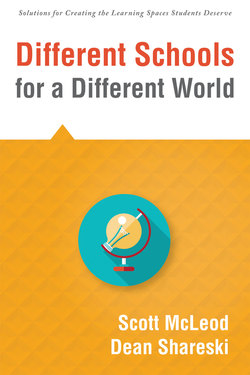Читать книгу Different Schools for a Different World - Dean Shareski - Страница 8
ОглавлениеForeword
By William M. Ferriter
Can I ask you a tough question? How many students in your classrooms are truly satisfied with the learning spaces you have created for them? If your kids reflect the national average, the answer is bound to be discouraging. Fewer than four in ten high schoolers report being engaged in their classes, and students often list boredom as the primary reason for dropping out of school (Busteed, 2013). Over 70 percent of students who don’t graduate report having lost interest by ninth grade and, worse yet, the majority of dropouts are convinced that motivation is all that prevented them from earning a diploma (Azzam, 2007).
These numbers are troubling for anyone passionate about schools. They indicate systemic failure on the part of practitioners to inspire learners and warn us of the immediate need to transform education—a warning that school leadership expert and series contributor Scott McLeod (2014) issues:
If we truly care about preparing kids for life and work success—we need schools to be different. If economic success increasingly means moving away from routine cognitive work, schools need to also move in that direction. If our analog, ink-on-paper information landscapes outside of school have been superseded by environments that are digital and online and hyperconnected and mobile, our information landscapes inside of school also should reflect those shifts. If our students’ extracurricular learning opportunities often are richer and deeper than what they experience in their formal educational settings, it is time for us to catch up.
Scott is right, isn’t he? Our schools really do need to catch up if they are going to remain relevant in a world where learning is more important than schooling—and catching up can only start when we are willing to rethink everything. We need to push aside the current norms defining education—that teachers are to govern, direct, and evaluate student work; that mastering content detailed in predetermined curricula is the best indicator of student success; that assessment and remediation are more important than feedback and reflection; that the primary reason for investing in tools and technologies is to improve on existing practices. It’s time to implement notions that better reflect the complexity of the world in which we live.
That is the origin of this series. It is my attempt to give a handful of the most progressive educators that I know a forum for detailing what they believe it will take to make schools different. Each book encourages readers to question their core beliefs about what meaningful teaching and learning look like in action. More important, each title provides readers with practical steps and strategies for reimagining their day-to-day practices. Here’s your challenge: no matter how unconventional ideas, steps, and strategies may seem at first, and no matter how uncomfortable they make you feel, find a way to take action. There is no other way to create the learning spaces that your students deserve.
